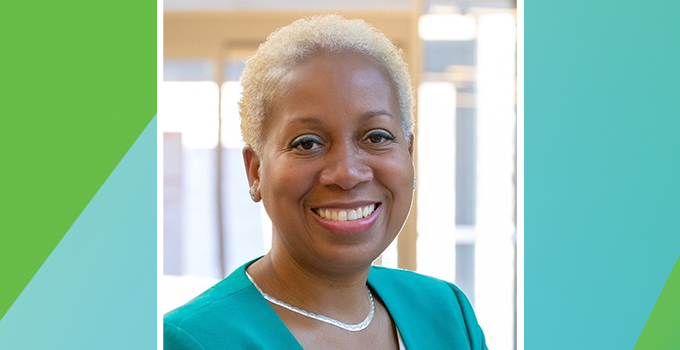Professor Juliet Daniel is working to end inequities for Black researchers while also running a cutting-edge cancer research lab.
In a room full of her peers, Professor Juliet Daniel says she “stuck out like a sore thumb.”
It was the early 2010s, and Prof. Daniel was attending a conference with hundreds of Canadian cancer researchers. Though she had been a cancer biologist for two decades and was about to be named Professor at McMaster University, she still felt out of place as one of just two Black people at the conference.
“It was shocking,” says Prof. Daniel. “How could there have only been two Black cancer researchers in Canada?”
Prof. Daniel already knew her path from the Barbados to a prominent position in Canadian academia was more difficult than for many of her peers. She heard some colleagues quietly dismiss her accomplishments as if she was getting special treatment because of her race or gender. At the same time, she had grant applications rejected because her research on triple-negative breast cancer – which disproportionately affects Black women – was deemed “not relevant to the Canadian context.”
But it wasn’t until that conference that she realized how rare it was for a Black Canadian woman to advance to her position. “I had been working in research for twenty years and had no idea how little Black representation there was,” she says.
Black Canadians are largely underrepresented in science and technology fields despite accounting for about 3.5 per cent of the country’s population. There are biases – both historical and current – that have discouraged Black youth from pursuing careers in science, and advocates say that Canada’s system for funding research is partly to blame.
For example, certain research grants require that applicants have previously received other grants, or hold a leadership position. Since major grants and leadership positions have historically not been available to marginalized populations, Black researchers can have limited opportunities to get funding and advance their careers.
Prof. Daniel says these and other inequities are causing young Black scientists to leave the country seeking better opportunities, or to leave research altogether. She has trained and mentored at least three outstanding Black trainees who chose not to continue with research.
“They self-selected out because they saw what I went through,” she says.
In the years after that first national conference, Prof. Daniel and a small group of Black scientists discussed ways to connect and empower their community. Then in May 2020, the murder of George Floyd by a Minneapolis police officer galvanized them to act.
“Many of us were very upset,” she says. “We needed to do something to show that Black people are more than what is portrayed in the media.”
Two months later, Prof. Daniel and her colleagues founded the Canadian Black Scientists Network (CBSN) hoping to bring more Black youth into the sciences, increase representation of Black researchers, and advocate for more equitable funding. Thanks to the hard work of CBSN’s volunteer steering committee, the network has grown from a couple dozen members in 2020 to more than 300 as of early 2022.
CBSN held its first annual conference, Black Excellence in STEM & Medicine (BE-STEMM), this month, and Prof. Daniel says the impact was profound.
“People keep telling us how inspired they were attending a conference and seeing so many Black scientists speaking,” she says. “Some cried during the sessions. They didn’t know how much their soul needed this.”
Though the conference was a success, Prof. Daniel says CBSN needs sustainable financial support to continue engaging and advocating for Black scientists. Beyond that, she says Canada needs to make a concerted effort to overcome historic inequities in the sciences. But with many institutions now launching initiatives to better support researchers from diverse backgrounds, she is hopeful change is on the horizon.
OICR has made equity, diversity, and inclusion a priority in its research, training and funding programs, aiming to reduce historic and ongoing biases.
“Canada’s diverse population is a huge strength. Having a diverse and inclusive research community improves the quality of our science and ensures that people from all communities benefit from research discoveries,” says OICR Executive Vice President Christine Williams, who participated in a panel at CBSN’s recent conference. “And so OICR is committed to supporting more scientists from traditionally underrepresented communities through our Rising Stars network and Investigator Award program.”
In 2021, Prof. Daniel joined the Canadian Institutes for Health Research’s new External Advisory Committee on anti-racism, and she says the committee is exploring changes to funding structures that could help level the playing field.
Prof. Daniel is now Associate Dean of Research and External Relations for McMaster’s Faculty of Science, where her lab aims to understand the factors that regulate and control cell adhesion and motility to inform innovative cancer therapies. She has led cutting-edge research into triple-negative breast cancer and the role of the Kaiso gene – which she discovered and named – and regularly collaborates with OICR’s Diagnostic Development program.
Prof. Daniel also continues to mentor aspiring Black researchers and says that if their talents are not supported with more equitable opportunities, Canada could miss out.
“Black Canadians have contributed so much to Canada in the past, we are currently contributing, and we will continue to contribute,” she says. “It will be to Canada’s detriment if we don’t support a diversity of voices, experiences and ideas.”

